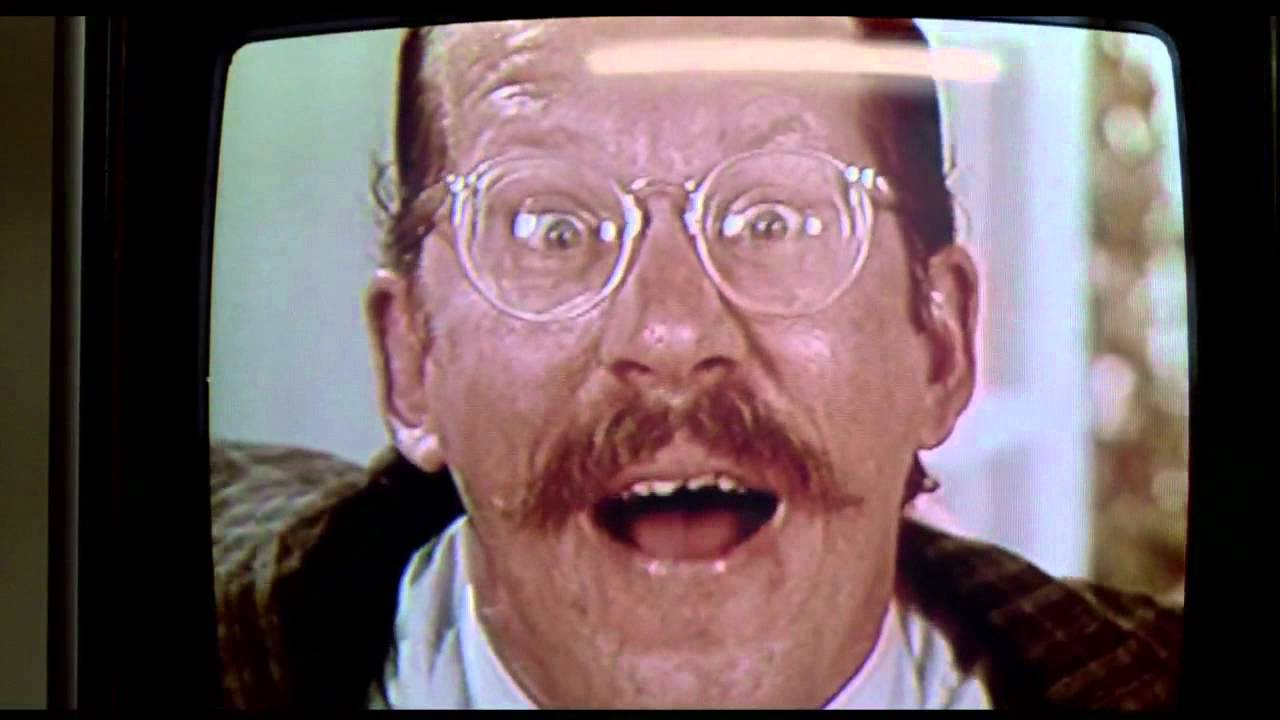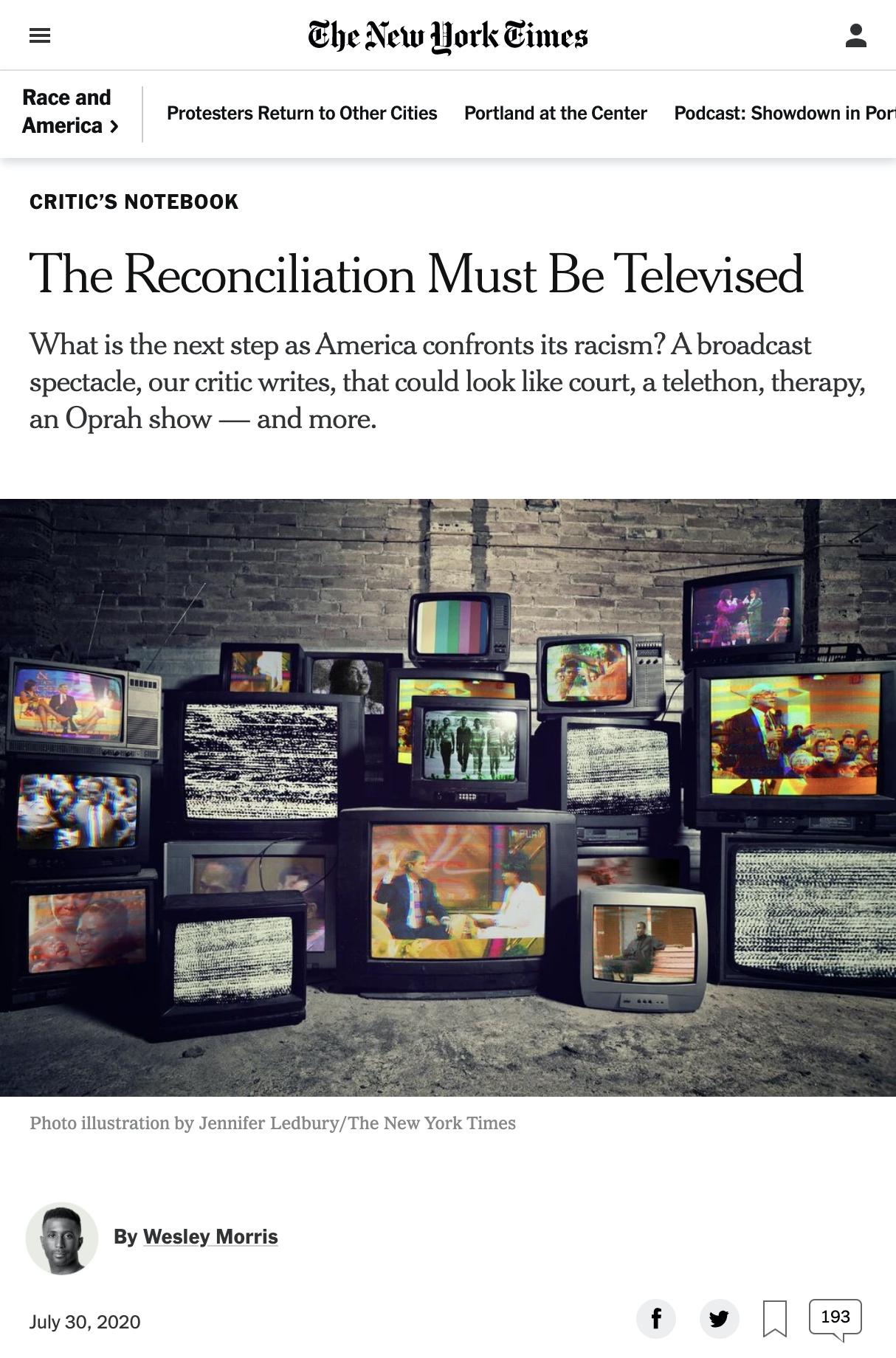The New York Times is now demanding that white people face mass show trials for racism. These events are to be televised in grand public spectacles lasting months, broadcast on all channels so there is no escaping them.
Written in the embarrassingly over-wrought prose characteristic of a negro trying to punch above his intellectual weight, Wesley Morris’ article offers us a blueprint for “racial reconciliation.” This blueprint involves evil Wypipo engaging in hysterical confessions of wrong-doing and begging forgiveness from their victims, the innocent descendants of the sub-Saharan slave diaspora.
So here we are, still in this Moment, tasked to behold the changing of names and the signaling of virtue. Waiting for meaningful legislative reform, seizing matters with civilian hands in the meantime: recasting jobs; reclaiming parks and pedestals and city streets, these local reclamations, seemingly one public space at a time. The speed of change in a country notoriously allergic to it feels like a spree, reckoning as a marathon of “Supermarket Sweep.” We know The Moment is connected to other moments yet there’s a sense in our bones that it differs from them. Who knows when such a Moment might come along again?
Before it vanishes, the centuries and conditions that produced it warrant commemoration. They warrant further confrontation, reclamation and connection. They warrant an event — broadcast across the country, over months, not days — that squares the present with the past, that explains The Moment to those who say they are, at last, awake to it. This Moment of historic holding to account, of looking inward, deserves a commensurate, totalizing event that explains what is being reckoned with, demanded and hoped for, an experience that rubs between its fingers the earth upon which all those toppled monuments had so brazenly stood. The Moment warrants a depth of conversation the United States has never had. It demands truth and reconciliation.
Other countries have undergone such commissions, tribunals and soul searching — among them, El Salvador, Rwanda, Peru, Germany, South Africa. They recount staggering atrocity — inconceivable corruption, organized oppression, genocide. Of their participants, they compel confession and vulnerability. Of their audience, they require fortitude, a pillow to wail into, a strong stomach.
…
A truth and reconciliation event in 2020 would help make up for 150 years of missed opportunities. It should be broadcast live and streamed the way impeachments and inaugurations are; the way certain trials are. That would require more than just ABC’s audacity, however backhanded. It would need CBS’s, NBC’s and Fox’s; CNN’s, BET’s and the Weather Channel’s. It would demand the platforms of Netflix, HBO, Disney+, Hulu and Amazon. There would be no escaping this thing, since there is no escape in the daily lives of many Americans. We’ve marched for systemic reform. This event — some of it recorded, some broadcast live — would tell the horror story of the system, draw straight lines from slavery to right now and demand the system be reformed.
South Africa is the model. When white people handed over power to the kaffirs and watched their country implode, their living standards plummeted and an oasis of decency transformed into just another failed African state.
In South Africa, in 1996, a Truth and Reconciliation Commission arose from an agreement to grant amnesty to those who confessed to crimes against humanity committed during more than four decades of Apartheid. The commission took statements from 22,000 victims and witnesses; thousands of people applied for amnesty; and a kind of extralegal trial ensued in which the perpetrators faced their victims.
Some of the hearings were broadcast on Sundays for two years in hourlong episodes and some, on very few occasions, were live. Initially, the government resisted televising them at all but relented to international pressure.
These show trials will not focus on specific alleged acts of injustice, as a normal trial would be expected to do. Here an entire race is to be placed in the dock. The charge? Racism, a word so vague in meaning that at this point it is simply a form of anti-white hate speech that pathologizes normal existence for anyone of European ancestry.
The white people who bought, owned, traded, lashed and raped Black people are long dead. Their descendants are among us. Slavery, however, wouldn’t be the subject of this televised reckoning. Racism would. A crucial chunk of a truth and reconciliation broadcast would use the work of scholars and thinkers like Matthew Desmond, Ta-Nehisi Coates, Nikole Hannah-Jones, Isabel Wilkerson and Richard Rothstein to enumerate the means by which the country has prospered from the theft of land and the strategic denial of housing.
…
Weeks could be spent covering housing with, among other things, a series of documentaries that highlight the many government and government-backed programs designed to strengthen segregation and bolster so-called ghettos.
…
Weeks more could be spent on law enforcement, telling the story of America’s police force, its roots in enslavement and how racism now seems so inextricable from policing that calls for its abolition have migrated from the ideological fringes.
As the Racism show trial plays out, white people will be expected to take the stage and offer tearful admissions of guilt, with Oprah Winfrey acting as Confessor in Chief.
This reckoning event would in part entail stories of the ways in which the poison of racism has ruined lives and wrecked families…Then we’d hear from the officials and schemers who neglected and bilked them. Their confessors would be the likes of Oprah Winfrey, Gayle King, Terry Gross, Katie Couric, Trevor Noah, Brian Lehrer, Cheryl Strayed and Connie Chung, people who excel at listening, people whom Americans are used to listening to, people whose ears seem connected directly to their hearts. The listening feels important. So does the facilitation of dialogue. This makes someone like Winfrey critical to the undertaking. She is a pioneer of televised reckoning and remains a master facilitator.
“My wife was raped and killed by a gang of blacks. After that, I became a racist. But now I realize it was all because of slavery and I was wrong to hate. Can you ever forgive me?” Cue a big hug from Oprah.
This is an inflection point for our entire civilization, one that will determine whether or not it continues to exist. We either bend the knee to the brown horde or we resist. If Trump loses in November, the White Guilt narrative will play out unrestrained. Demographic engulfment awaits with centuries of tortured existence for our people to come.


